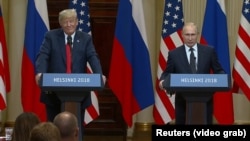At the press conference in Helsinki, Russia’s President Vladimir Putin claimed the case against the Russian firm indicted for interfering in the United States election process had fallen apart in the U.S. court.
“We heard accusations against the company Concord. As I understand it, this company hired American lawyers, and the accusations against it just fell apart in a U.S. court,” Putin said.
The comment is demonstrably false, as we will show.
The trial in the case “USA v. Internet Research Agency LLC #1:18-cr-00032” has not yet begun, nor has the judge ruled on the merits of Mueller allegations.
“President Putin’s characterization of this case is a classic example of mistaking arguments for outcomes. This doesn’t work in real life, and it certainly doesn’t work in an independent judiciary,” said Christopher Swift, national security lawyer at Foley & Lardner LLP and adjunct professor at Georgetown University, in an e-mail response to Polygraph.info.
The defendant in the case – Concord Management and Consulting LLC – is a Russian firm that the indictment said had several multimillion-dollar contracts with the Russian government and has been “engaged in operations to interfere with U.S. elections and political processes.”
The charges against the firm consist of eight counts including “conspiracy to defraud the United States; conspiracy to commit wire fraud and bank fraud; aggravated identity theft.”The indictment said Concord Management was “the primary source of funding” for the so-called Russian troll farm’s interference in the 2016 U.S. election.
James C. Martin, the attorney at the U.S. law firm Reed Smith LLP, who represents the Concord Management and Consulting LLC in the U.S. District Court in Washington, DC, told Polygraph.info that “the case is still in a pre-trial stage and is active.”
Peter Carr, the spokesman of the Special Counsel's office, told Polygraph.info that the judge has not yet moved on these motions and confirmed that the case is active and has not been dismissed.
“At this point in the proceedings, Concord’s attorneys are trying to dismiss the case before it goes to trial by filing motions challenging the prosecutor’s authority to bring the case on various legal grounds,” Swift said. “Filing a motion to dismiss like the ones we have seen in the Concord case is a standard part of any criminal defense strategy. It would be surprising — and maybe even professional malpractice — if defense counsel didn’t take these steps.”
On July 16, the attorneys for Concord Management and Consulting LLC filed a motion to dismiss the case, based on the claim that “the Special Counsel’s appointment violates the Constitution’s Appointments Clause.” The motion, however, does not dispute the allegations in the indictment.
The same day, the U.S. Department of Justice countered with an argument that the defense notion “should be denied because the Special Counsel was validly appointed and is validly conducting the prosecution.”
“The fact that defense counsel filed these motions to dismiss does not necessarily mean they have legal merit. That is for the judge to decide, not the defense lawyers,” Swift said. “Sometimes a judge will agree with the argument raised by defense counsel and grant their motion. But that hasn’t happened here… at least not yet.”








